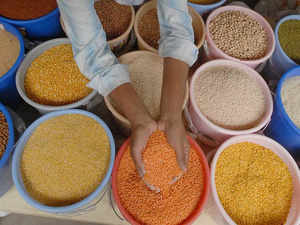
Also Read: A look into India's tur problem: Why is this dal always on the boil?
While speaking at a webinar on outlook of kharif crop organised by trade body Indian Pulses and Grains Association (IPGA) on Friday, various experts opined that India is likely to face supply shortages till the first week of Diwali. There is likely to be a shortage of 1 million tonnes of tur till the harvest of new crops begins in December/January, while the production of kharif moong is expected to be lower by 12%. The quality of urad crop under harvest has been damaged due to rainfall in September.
However, despite the supply tightness, pulse prices have shown a downward trend during the last fortnight due to various price control measures taken by the central government. On Tuesday, the central government reduced the stock holding limit on wholesale traders from 200 tonnes to 50 tonnes. The stock limit for each pulse is now 50 tonnes for wholesalers, 5 tonnes for retailers, 5 tonnes at each retail outlet and 50 tonnes at depot for big chain retailers.
Bimal Kothari, chairman, IPGA said, "The reduction in stock limit was not required as the prices of pulses were ruling stable.”
Organised retail is finding it tough to manage their inventories within the new stock limit restrictions. "We have 4000 stores across the country. Our daily requirement of pulses is much higher than the stock limit of 50 tonnes," said Dilip Mohanty, senior VP Reliance Retail while speaking at the webinar. “We are going to make a representation to the government,” added Mohanty.
Moving pulses from the production centres concentrated in a few states across the country has become a challenging task for the millers and the processors.
"The wholesalers need to buy 3/4 different qualities of the same dal. Most trucks are of 25-30 tonnes capacity, while the stock limit on the wholesaler is of 50 tonnes. As a result, there are no wholesale buyers for pulses at present," said Nitin Kalantry, a pulses processor from Latur in Maharashtra.
The new stock limit has accelerated the downward movement of prices, said trade and industry leaders. The ex-mill prices of tur dal have come down by 2% to 4% at different centres since Tuesday.
"There are no buyers even after reduction in prices. We are working at less than 50% of our capacity," said Rupesh Rathi, a pulses processor from Akola in Maharashtra.

Download The Economic Times News App to get Daily Market Updates & Live Business News.






 Get Unlimited Access to The Economic Times
Get Unlimited Access to The Economic Times

